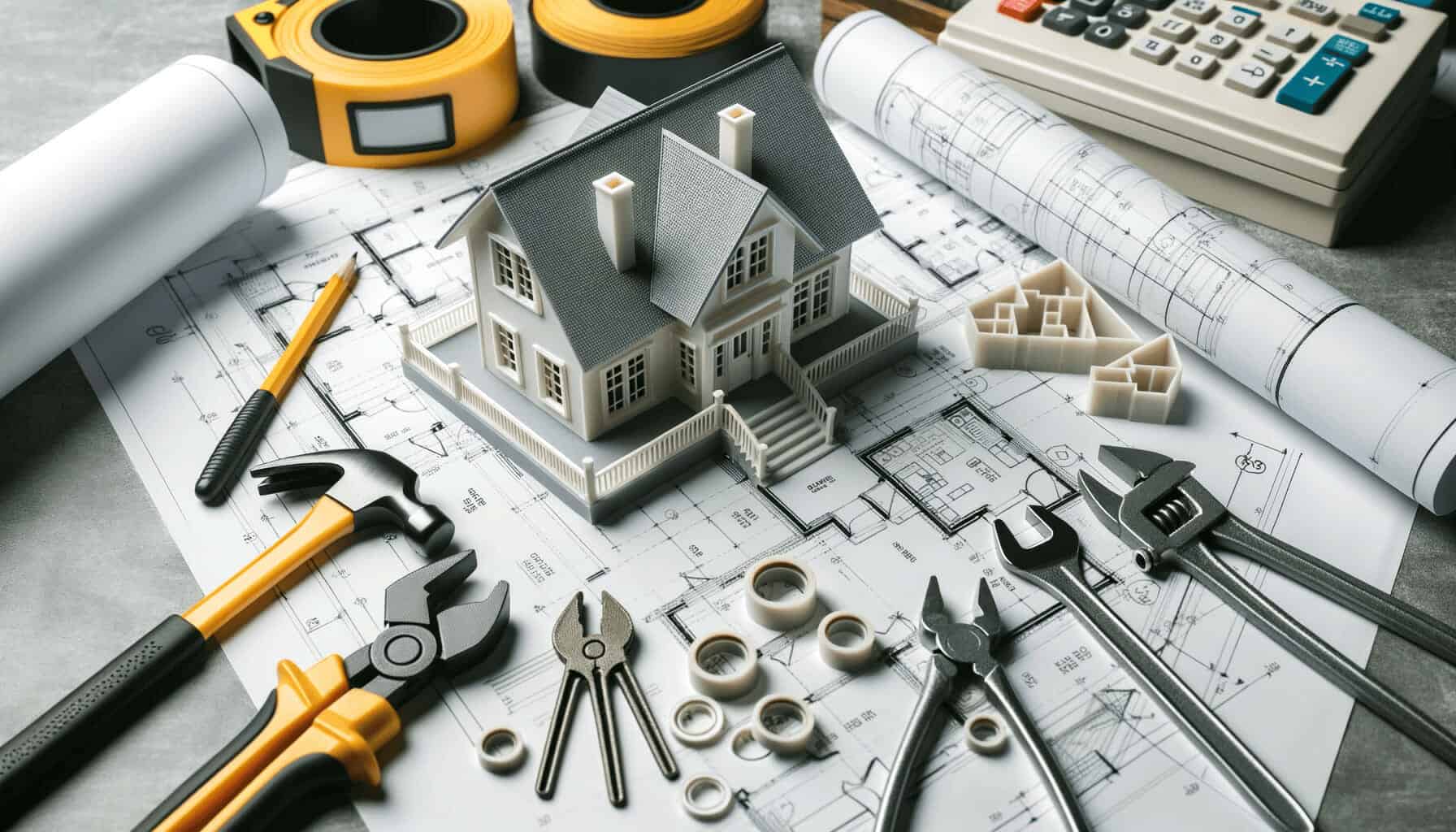
Blog
Important Steps in Making Your Own Land House

Important Steps in Making Your Own Land House
Introduction
Owning your own home is the dream of every individual. However, what is more interesting than owning a house is the ability to make a house on your own land. Imagine, every inch of the house is designed according to your taste, needs, and dreams. In this article, we will discuss in detail the steps that need to be taken to make a house on your own land.
There are many advantages if you choose to make your own home. Among them is the freedom to choose the design, layout, and building materials you like. In addition, you also have full power in determining the location and orientation of the home, which can affect the comfort and energetic efficiency of the home.
However, making a home is not an easy task. It requires careful planning, extensive knowledge and high commitment. Therefore, this article will be your guide in this journey. From preparing a budget to getting approved, we’ll guide you through every important step.
Advantages of Building a House on Your Own Land:
- Freedom in design
- Full control over materials and construction quality
- Opportunities to maximize energy efficiency
Risks and Challenges:
- Time-consuming approval process
- Additional cost risk
- The need to manage many technical aspects
So, if you are interested in creating your own dream home, read on. We will discuss each aspect in detail, and provide you with all the information you need to start this project with confidence.
For more information on the construction process and financial requirements, you can refer to our bank financing eligibility calculator .
1. Prepare a Budget for Home Construction
Building a house on your own land is a project that requires careful financial planning. Before you start anything, it’s important to know how much money you need and how much you can afford to spend. In this section, we will discuss some important steps in preparing a budget for your home construction project.
Identify Sources of Income and Expenditures
The first step in preparing a budget is to identify all your sources of income and how that money is spent each month. This includes salary, side income, savings, etc. In addition, you also need to consider all your financial commitments such as loan payments, utility bills, and living costs.
Using the Calculator Tool
To facilitate this process, you can use the bank financing eligibility calculator provided on our website. This tool will help you determine how much loan you qualify for based on your income and expenses.
Determining Construction Costs
After knowing how much you can afford to spend, the next step is to determine the cost of construction. This includes the cost of construction materials, labor wages, approval and permit costs, as well as other costs that may arise throughout the project. It is recommended to get several quotes from different contractors to get a clearer picture of construction costs.
Provide an Emergency Fund
Apart from the estimated costs, it is wise to prepare an emergency fund. This is to cover any additional costs or delays that may occur. As a guide, this emergency fund should preferably be between 10% to 20% of the total cost of the project.
Monitor and Adjust Budget
Once the budget is prepared, it needs to be monitored and adjusted over time. This is to ensure you stay within budget and avoid any financial problems later on.
With careful financial planning, you will be more confident and ready to start your dream home construction project. For more information on construction financing, you can refer to our FAQ .
2. Check the Land Title Status
Before you start a house building project, one of the critical steps to take is to ascertain the title status of the land where you will build the house. Land is the foundation of every construction project, and understanding its ownership status is important to avoid any legal problems in the future.
Suitable Land Criteria
Choose land that meets certain criteria such as location, size, and topography. Also make sure that the land has easy access to basic facilities such as roads, water supply, and electricity. You can refer to our project locations to get an idea of a suitable location.
Types of Land Titles
In Malaysia, there are several types of land ownership such as Permanent Ownership (Freehold) and Temporary Ownership (Leasehold). Each type of title has its own advantages and disadvantages, so make sure you understand what you own before starting a project.
Property Rights Approval Process
Once you have selected a suitable land, the next step is to obtain approval from the local authorities. This includes obtaining various types of permits and approvals such as building plans, site plans, etc. You can refer to the list of PBT in Selangor for more information.
Valuation by a Chartered Surveyor
It is recommended to appoint a certified surveyor to do the land assessment. This is to ensure that the land meets all technical and legal requirements before starting construction.
Checking Legal Documents
Be sure to check all legal documents such as Certificate of Ownership, land grants, and any agreements that may exist. If necessary, seek advice from an experienced real estate attorney.
By ensuring that all aspects of land ownership are secure and legal, you will be able to start your project with more confidence and peace of mind. For more information on the approval process and required documents, you can refer to contact us .
3. Appoint a Qualified Team
After preparing the budget and ensuring the status of land ownership, the next step in making a house on your own land is to appoint a qualified team. This team usually consists of architects, surveyors, and contractors. They will work together to ensure your project runs smoothly from start to finish.
Choosing an Architect
An architect is the person who will help you design your dream home. They will ensure that the design of the house meets your needs and also complies with the guidelines set by the local authority. You can refer to our house specifications to get an idea of what can be done.
Selecting a Surveyor
A certified surveyor is essential to ensure that all technical aspects of your project comply with established standards. This includes land surveying, structural assessment, etc. The surveyor will also assist in the approval process of documents and permits.
Selecting a Contractor
The contractor is the party that will carry out the construction. Choosing an experienced and certified contractor is important to ensure quality work. You can refer to our IBS home contractor to get the best service.
Each Role in the Project
Each team member has a specific role. Architects plan, surveyors evaluate, and contractors execute. It is important to ensure that all parties work well together to achieve the same goal.
Preparing Agreements and Contracts
Before starting work, make sure you have a clear agreement or contract with all parties involved. This is to protect your interests and ensure that all parties understand their responsibilities.
By appointing a qualified team, you will ensure that your home construction project runs smoothly and on schedule. For more information on how to choose the right team, you can contact us .
4. Prepare a Home Building Agreement
Building a house is a big commitment, both in terms of time and money. Therefore, it is important to ensure that all aspects of the project are well organized through an agreement or contract. In this section, we will discuss the importance of contract agreements and how to choose the right contractor and lawyer.
The Importance of Contractual Agreements
A contract of agreement is a legal document that outlines the responsibilities and rights of each party involved in a construction project. It will ensure that all parties understand what is expected of them and what they will receive in return. You can refer to our FAQ for a sample agreement contract.
Get to Know the Terms and Conditions
The terms and conditions in the contract must be clear and specific. This includes construction schedule, cost, quality of materials, etc. Make sure you understand every clause in the contract before signing it.
Choosing Contractors and Lawyers
Choosing the right contractor and attorney is essential in ensuring the success of your project. Make sure they have a good track record and are experienced in similar projects. You can refer to our IBS home contractor to get the best service.
Problem and Dispute Resolution
The contract should also contain a mechanism to resolve any problems or disputes that may arise. This includes procedures for making a claim, settlement through mediation, or legal action if necessary.
Review and Sign the Contract
Before signing a contract, it is wise to seek advice from a lawyer experienced in construction or real estate matters. This is to ensure that you understand all terms and conditions and are protected from any risk.
With a good agreement contract, you will ensure that your home construction project will run smoothly and according to what is expected. For more information about agreements and contracts, you can contact us .
5. Evaluation Process by Bank and LPPSA
Once all planning and agreements are completed, the next step is to secure financing for your project. In Malaysia, there are two main sources of home financing, namely housing loans from banks and loans from the Public Sector Housing Finance Board (LPPSA). In this section, we will discuss the evaluation process by these two institutions.
Evaluation Criteria by the Bank
Banks will usually assess your financing eligibility based on a number of factors such as income, credit record, and collateral value. You can use our home loan calculator to get a rough estimate of how much loan you qualify for.
Required documents
To apply for a housing loan from a bank, you will need to provide several documents such as payslips, bank statements, and identification documents. Make sure you check the list of required documents before applying.
Evaluation Process by LPPSA
If you are a civil servant, you may be eligible to apply for a housing loan through LPPSA. The evaluation process and criteria are quite different from banks. You can refer to the LPPSA government loan for more information.
Advantages and disadvantages
Each funding source has its own advantages and disadvantages. Loans from banks are usually more flexible but have higher interest rates. While loans from LPPSA are more stable but require a stricter process.
Obtaining Approval
Once all the documents are prepared and the evaluation is done, the next step is to wait for approval. This process can take anywhere from a few weeks to a few months, depending on many factors.
By getting the right financing, you will ensure that your home construction project goes smoothly. For more information on financing and evaluation, you can refer to the bank loan eligibility review and LPPSA .
6. Construction Process Begins
Once all the preparations and approvals are complete, it’s time to start the process of building your home. This is the most exciting but also the most challenging phase of a home building project. In this section, we will discuss some important steps that need to be taken throughout the construction process.
The Importance of Monitoring
One of the most important aspects of the construction process is monitoring. You or your representative should monitor the progress of the work periodically to ensure that everything is running according to schedule and specifications. You can refer to our video to see an example of the construction process.
Manage Money Claims
Throughout the construction process, there will be several phases where you will need to claim money from your financing. This is usually done based on certain milestones in the project, such as completion of the foundation or building structure.
Construction Site Safety
Safety is a priority in every construction project. Ensure all employees follow safety guidelines and use appropriate safety equipment. You can refer to our security door to get ideas about security measures that can be taken.
Facing Challenges and Obstacles
Not all construction projects go smoothly. There will be times where you have to face challenges and obstacles, such as delays, weather changes, or technical problems. In these situations, good communication between all parties involved is key to resolving the issue quickly.
Final Phase and Settlement
As the project nears completion, you will need to do some final checks to make sure all the work has been done correctly. This includes quality checks, utility system testing, etc.
With strict monitoring and good management, you will ensure that your dream home is built with high quality and on schedule. For more information about the construction process, you can contact us .
7. Obtain a Certificate of Completion and Compliance (CCC)
After all the construction process is completed, the last step to be taken is to obtain the Certificate of Completion and Compliance (CCC). This document is proof that your home has been completed and complies with all standards and regulations set by the local authority. In this section, we will discuss how to get CCC.
What is CCC?
The CCC is a document issued by a certified architect or surveyor that confirms that your home has been completed and complies with all standards and regulations. You can refer to our IBS panel advantages to understand more about the standards that need to be complied with.
Application Process
To get a CCC, you need to apply through a certified architect or surveyor involved in your project. They will do a final check and fill in the relevant application form.
Required documents
A number of documents need to be included in the CCC application, including approved building plans, inspection reports, and any other documents that may be required by the local authority.
Process Duration
The duration of obtaining a CCC can vary depending on many factors, including the complexity of the project and the competence of the local authority. However, usually it will take between 2 to 6 months.
Advantages of Obtaining a CCC
By obtaining a CCC, you not only ensure that your home complies with standards, but also increase the sale value of the home. In addition, this document is also required if you want to sell the house or apply for a housing loan in the future.
Getting a CCC is the final step in your home building process, and it signifies that you can now enjoy the fruits of your hard work. For more information about CCC and its application process, you can contact us .
Summary and Conclusion
Building a house on your own land is a complex but satisfying process. From the initial planning stage to obtaining the Certificate of Completion and Compliance (CCC), each step requires detailed attention and good management. In this article, we have discussed seven important steps in this process:
- Advances and Early Planning : Understand your needs and budget.
- Check Land Title Status : Make sure the land you choose is suitable and legal.
- Appoint a Qualified Team : Choose experienced architects, surveyors, and contractors.
- Prepare a Home Building Agreement : Prepare a clear contract and agreement.
- Evaluation Process by Banks and LPPSA : Choosing the appropriate financing source.
- Construction Process Begins : Monitor and manage the construction process.
- Get a Certificate of Completion and Compliance (CCC) : The final step to enjoying your dream home.
By understanding and following these steps, you will be more confident and ready to start your dream home building project.
If you have any questions or need further assistance, please do not hesitate to contact us . We at Masjaya Eco Construction are experts in IBS house construction and are ready to help you in every step of this journey.
Thanks for reading, and good luck with your home building project!
















